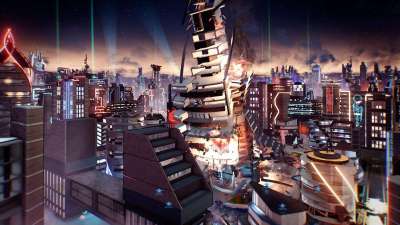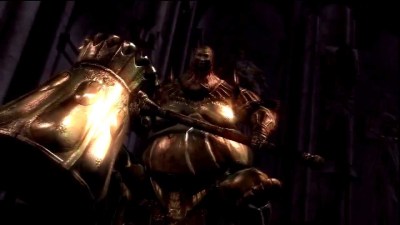Even decoupled from Project Ego’s infamous reputation, Fable: The Lost Chapters remains an ambitious undertaking that underlines everything troublesome about the gaming industry’s fixation with innovation. As an action-RPG, it’s simplistic, button-mashy, poorly balanced, and a bit repetitive. As a story, it’s inconsistent and discordant.
But as a project, Fable: The Lost Chapters is somewhat faultless. It’s a mishmash of mechanics and storytelling tools that don’t always weave the most interesting stories. But when it does, it does so with such earnestness that it’s difficult to hate it.
At the time of its release, Molyneux’s words certainly cast it in a terrible light: there’s no magnificent oak tree coming from one beautiful acorn. There’s just the stock story of the Hero of Oakvale, a lot of farting, burping, tens of marriages in tens of towns, some light property management, and a lot of disappointment. However, decoupled from its backgrounds, Fable: The Lost Chapters is just pure, dumb fun.
Fable went through multiple releases, initially released on the Xbox in 2004, then in 2005 as Fable: The Lost Chapters on Xbox and PC. More recently, it was re-released as Fable Anniversary for the Xbox 360 and PC in 2014. As games, they permeate the wider gaming community as repositories of shattered dreams, and the original’s release forever cast Molyneux as the gaming industry’s dictionary definition for the phrase “broken promises”.
Fable: The Lost Chapters is a stock Hero’s Journey. The Hero of Oakvale begins as a young boy, whose idyllic life is wrestled away from him as bandits attack his hometown. Before he’s killed, an old wizard named Maze saves his life and enrolls him in the Heroes Guild, whereupon he becomes rivals with fellow hero Whisper, learns the basics of hero…ness, and eventually graduates and is loosened upon the world. From there, the Hero runs into the vile puppet master Jack of Blades, whom the he must defeat and whose tyranny he must smash.
“Loosened” is somewhat of an odd choice of words perhaps, but it’s quite accurate when describing the vagueness of the world’s inhabitants: Heroes don’t have clear identities. At the Hero’s graduation ceremony, the Guildmaster firmly states that the Hero has a choice - to be good or be evil. Though it’s clear that the Guildmaster’s words is a mechanical reference (players are free to play as a good guy or a bad guy), in terms of the narrative it establishes Heroes as wandering vagabonds. Over the course of the story, the guild’s notable heroes are oftentimes presented as glib narcissists, wandering superhuman thugs, or a mix between the two. Aside from Maze the vast majority of them are assumptive, presumptuous, and highly unlikeable. An atmosphere of cutthroat behavior underlines the Heroes Guild, with its members jockeying for cards (Briar Rose) or threatening other Heroes (Thunder).
In a way, Fable: The Lost Chapters undermines many traditional tropes of heroes that are oftentimes presented in…well, fables. The game is quite aware of its surroundings and its intended narrative frame, but it also attempts to position the needs and wants of these mythical people as highly amoral. Given Molyneux’s own glibness in Black & White, it’s likely that this is intentional.
This persistent amorality works well in Fable: The Lost Chapters. Because the game gives you the freedom to play as a giant dick or a zealous do-gooder, it establishes the Hero of Oakvale as a magnified example of the game’s pre-existing Heroes. Thunder, Maze, and Briar Rose are all involved for their own personal gains, some of them good and some of them bad. Though it’s not profound, it’s a very cleverly enmeshed marriage of ludic and narrative components.
But because the game is a by-the-books Hero’s Journey the plot doesn’t really experiment. Fable: The Lost Chapters is frank in its presentation: the Hero is thrust into a position where he takes responsibility and defeats the big bad with the help of others. Through this journey, he faces several trials that ultimately make him a better character.
The trouble is that most of the characters in Albion don’t effectively support its story. Poignancy can certainly be found in Maze’s death, and there’s a degree of twisted catharsis in Whisper’s murder, but Fable never sufficiently establishes a strong enough bond between the Hero of Oakvale and these characters outside of a highly limited set of cutscenes. Loss in Fable: The Lost Chapters isn’t as hard-hitting or deep as many other games, because the characters that die don’t feel like people: they feel like NPCs. In this case, it feels like a watching exercise than an experiencing one. The Hero of Oakvale’s connection with these people are disengaged from the player to the extent where no matter what happens to these people, your interactions with them aren’t meaningful enough to elicit a powerful emotional reaction.
In many cases this isn’t a massive issue. Fallout 3 is notorious for its poor characterization of pretty much everyone, for instance. Trouble arises however when a few of Fable’s moral choices stem from any semblance of characterization it establishes. Dilemmas rest upon whether you care about Theresa, Whisper, Thunder, or Rose, but the game never makes a considerable effort to present as them as characters you should care about. Conflict from moral choices arise from emergent narratives in the game, and how powerful that narrative is depends upon the imagination and the empathy of individual players. It’s somewhat lackluster and inconsistent.
Since every Hero is in perpetual smarminess mode, they’re too eager to talk down to you or insult you. Even as Whisper is on her knees, begging for her life, she calls you “Farmboy” with the same lack of respect when you first work with her. These people aren’t unbearable, but they’re certainly not loveable, and only superficial relationships by association tie the Hero to any moral obligations that arise out of conflicts with them.
Mechanically, Fable: The Lost Chapters is busy. The game is a flurry of mashing and highly overpowered spells, with most bosses falling quite easily to a small handful of attacks. While it espouses several play styles, the highly unbalanced nature of its spells gives off the feeling that any non-spell gameplay is suboptimal. It’s is more than content to mob you with enemies where a slow great sword is too unwieldy to catch all of them, but a faster one-handed sword does too little damage to sweep in a timely fashion. It’s difficult to run through the game at a steady pace without garnering the Spellwarrior designation as a result, further cheapening its claims of offering meaningful choice.
However, this is ultimately a minor issue: Fable has so many different spell types that weave together with the swords, hammers, and bows that it’s really fun to play. The real problem is that it’s just not very difficult. Even at its most challenging, you’ll hardly scarf through crates of Resurrection Potions. Instead, you’ll likely consume two or three within the course of a single game. Play prudently, with a good eye for more powerful spells, abilities, and your general DPS, and you can run through the game unmolested.
In an industry spoiled by games as atmospherically oppressive as Dark Souls in recent years, going back to Lionhead’s series feels as if it is catering to the bottom line. It’s a relic. It’s accessible, but not necessarily difficult; it flirts with grimness, but refuses to tackle heavy moral themes; and it’s varied, but is far too lenient on sub-optimality. Fable: The Lost Chapters feels like a product to be consumed, easily interpreted and experienced by all.
And that’s a shame. So many phenomenal moments in Fable: The Lost Chapters are rarely seen or approached with such masterful terseness elsewhere. Particularly telling is a short scene with Rosie. A survivor of the bandit raid, Rosie catches the Hero on his return to Oakvale, and her presence prompts a flashback. With his fingers pressed against his temple, the Hero again finds himself standing amidst a burning Oakvale. After a concerned “Um, are you alright?” from Rosie, Oakvale returns to the present.
There’s some powerful maturity in that scene: up until that point, the game is content to lead you from scene to scene, moving at breakneck speed with little time to think about the Hero of Oakvale as an individual, detached from your own emergent narrative. But in that quiet moment, surrounded by the chirping of birds and the soft, halcyonic background music, the flames are a stark reminder that your character is ultimately one with baggage, regardless of your behavior. In this instance, the memories of a fiery Oakvale elevates - though briefly - the slaughter of the Hero’s family from convenient plot device to tragedy.
Unfortunately, as powerful and short this scene is, there are ten others that scream of their potential but too readily fall into the game’s overly binary moral system. While it’s understandable that a game promoted on moral choices would have them, they often dominate what little character dynamics actually exist. Since Fable has to reconcile the plot regardless of your decisions, certain conversations and quests come off as superfluous and underdeveloped. For instance, after killing Whisper in the Arena, Thunder threatens to kill you, but doesn’t act upon it; whether you murder Twinblade or not has no relevance on the assassins sent; whether you know Lady Grey’s secret or not does not change the fact that she becomes a generic marriage NPC after the wedding.
In many ways, Fable: The Lost Chapters is a game built upon crushingly huge amounts of potential, and it shows. As it is, it’s a vibrant, lively, wonderful world of eccentricities and witticisms and people puking from too much alcohol. But it’s a game with the chance to be much more than that, and we’re not talking about oak trees growing in real time or everything changing to the world around you. No, we’re talking about the game’s willingness to play around with Monomythic tropes without ever challenging them. We’re talking about characters that exhibit very human fears in a world that reacts very poorly to those fears. We’re talking about Heroes that aren’t Heroes, but rather cutthroats with the ability to cast spells, shaping worlds around them but oblivious to their role in greater society.
We’re talking about a game that could have been a mighty piece of commentary on games and games writing in general, but one which never takes advantage of it.



